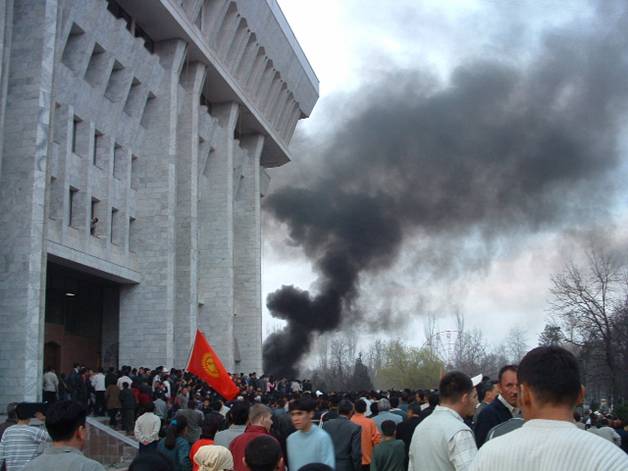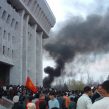
RUSSIA SEEKS CLOSER TIES WITH POST-REVOLUTIONARY KYRGYZSTAN
Publication: Eurasia Daily Monitor Volume: 2 Issue: 62
By:

In the aftermath of the revolution that has swept the Kyrgyz leadership from power and ushered in another democratic revolution in the former Soviet Union, Russia has sought to re-affirm its close ties with Kyrgyzstan. Indeed the Kremlin’s handling of the crisis reveals that Russian President Vladimir Putin’s closest aides have learned from the events in Georgia and Ukraine, and they are actively seeking to avoid the mistakes made by Russian authorities in their conduct of diplomacy during those tense situations. Putin has therefore reassured the new Kyrgyz leadership of the durability of bilateral relations, gained assurances concerning the future of the Russian airbase at Kant, and successfully carried off a show of acceptance regarding the new government for international consumption. Privately, Russian security officials fear the implications of democratic revolution emerging in the heart of Central Asia.
Kurmanbek Bakiyev, acting president and prime minister, confirmed Kyrgyzstan’s ongoing commitment to the Russian airbase at Kant, while also giving similar assurances on the future of the U.S. deployment at Manas. This has clarified the attitude of the Kyrgyz authorities towards their international military and security commitments, for the time being at least. These moves seem to reflect Kyrgyzstan’s security weakness and dependency upon foreign assistance in dealing with regional threats.
Bakiyev assured his Russian ally that Bishkek takes seriously its treaty obligations within the Collective Security Treaty Organization (CSTO), under which the Russian base operates. Interviewed by Trud, he was emphatic: “We shall adhere to them strictly, and there are even plans to expand and deepen relations with Russia.” Colonel-General Anatoly Nogovitsin, deputy commander-in-chief of the Russian air force, highlighted the durability of the Russian base, commenting on the positive attitude of the local population towards Russian servicemen in Kant. Nogovitsin expressed cautious optimism that the political turmoil in Bishkek will not affect the long-term Russian deployment in the country: “The agreement under which our pilots are stationed in the republic will not be reviewed in the near future.”
Although Putin actively engaged all political elements in the Kyrgyz crisis, and eschewed his earlier propensity to support the political status quo, as witnessed in his handling of the Ukrainian presidential crisis, he may well have decided to conceal Russia’s frustration with the democratic drift taking place in the former Soviet Union. Nikolai Bordyuzha, CSTO secretary-general, signaled something of the level of fear currently experienced within Russian security circles surrounding the Kyrgyz revolution. On March 25 he told Vesti that Kyrgyz President Askar Akayev had miscalculated and failed to understand the potential benefits of involving the CSTO in the crisis. But commenting on the actual swing against Akayev, he said, “Yes, we can possibly expect outbreaks of destabilization in other states. Uzbekistan and Tajikistan are just next door. I think something of a kind can emerge in Kazakhstan as well.”
Kazakhstan has reacted warily to Akayev’s political exodus. President Nursultan Nazarbayev hastily pointed out that economic weakness, poverty, and protests in several Kyrgyz districts had dangerously combined with weakness on the part of the government. He implied that the Kazakh authorities do not share that same weakness, while he also denied that political problems exist in Kazakhstan, despite the difficulties faced by the Kazakhstani opposition (see EDM, March 28).
Nevertheless, Nazarbayev will be concerned that the democratic forces of Kazakhstan heartily welcomed “the victory of freedom and democracy in fraternal Kyrgyzstan.” Zharmakhan Tuyakbay, leader of the Fair Kazakhstan Bloc of Democratic Forces could have been speaking about his own country when he congratulated the Kyrgyz opposition: “Akayev’s authoritarian family-clan regime, which had been bogged down in corruption and the increasing lawlessness that reached its apogee during the recent elections to the parliament, has collapsed under the pressure of popular protest.” Uzbekistan has, on the other hand adopted a friendly and constructive attitude towards the Bakiyev regime, offering material, financial, and humanitarian aid to assist in stabilizing the country.
Putin has handled the events in Kyrgyzstan with greater skill than in previous democratic revolutions on Russia periphery. In the short term he will seek to assist the authorities in Bishkek to stabilize the situation and deepen bilateral relations. But now faced with the stark consequences of revolution in former Soviet Central Asia, and recognizing the potential for this to ignite throughout the region, Putin now appears more isolated in adopting his brand of “managed democracy.” More telling still, he may face the consequences of other leaders in Central Asia regarding Moscow’s ability to keep them in power, sheltering them from democratic forces, as undermined by events in Bishkek. Russia appears powerless to forestall the level of political change through “popular protest” now sweeping through parts of the CIS.
(RTR-Russia TV, March 25; RTR Russia TV, March 25; Kazakh Television First Channel, Astana, March 25; Interfax-Kazakhstan March 25; Uzbek Television First Channel, March 25; Itar-Tass March 26; Interfax, March 27)




